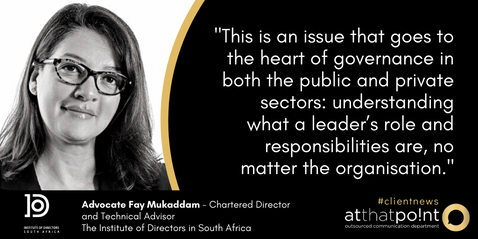|
The testimony of Dikeledi Magadzi, Deputy Minister of Transport, at the Zondo Commission has highlighted the fact that many in Parliament do not fully understand their role and responsibilities, says Advocate Fay Mukaddam, Chartered Director and Technical Advisor at the Institute of Directors in South Africa (IoDSA).
Ms Magadzi’s testimony concerned events in 2016 when she was chair of the Portfolio Committee on Transport. At the time, it was alleged that a R51 billion Passenger Rail Agency of South Africa (PRASA) tender had been rigged. Under her watch, the ANC members of the committee quashed a proposed investigation. During the same period, ANC MPs were instructed to vote against a parliamentary motion to investigate the Guptas and state capture. Her justification for these actions was that she sat in Parliament only as a member of the ANC: I’m not in Parliament as myself, I represent the African National Congress, and will always ensure that I toe the party line, and that is what I did.” Even more tellingly, she said that even knowing what she knows now about the Guptas and state capture, she still believes that what the party instructed its cadres to do was “correct”.[1] “Ms Magadzi is not an outlier. Many in Parliament simply do not fully understand the role they have to play,” Advocate Mukaddam says. “This is an issue that goes to the heart of governance in both the public and private sectors: understanding what a leader’s role and responsibilities are, no matter the organisation.” The problem is common in companies, where directors frequently see their role as one of advancing the interests of the stakeholder groups they represent. This a mistaken understanding, Advocate Mukaddam argues. “No matter how they are appointed, directors have a duty to act in the best interests of the entity itself, and nobody else. Only then are they able to fulfil their real purpose: exercising oversight over the executive and helping the organisation achieve its stated goals,” she says. “In many ways, Parliament constitutes the board of directors of South Africa Inc, with its committees playing a similar role in respect of various state-owned entities. No matter who puts them in Parliament, MPs and members of oversight committees have a primary allegiance to the country and its citizens as a whole.” While a far-reaching reform of the electoral system is probably going to be necessary in the long term, she continues, we must focus now on educating our parliamentarians on the basics of governance and what their roles and responsibilities are. “In effect, we need Governance 101, with the King Report as the essential guide,” she says. “We don’t need new frameworks or position papers—we already have everything we need. We must implement what we have and ensure that those that fall short suffer the consequences.” [1] Jan Gerber, “’I represent the ANC, and I will always toe the party line’—Magadzi tells Zondo Commission”, News24 (8 February 2021), available at https://www.news24.com/news24/southafrica/news/i-represent-the-anc-and-i-will-always-toe-the-party-line-magadzi-tells-zondo-commission-20210208. ENDS MEDIA CONTACT: Stephné du Toit, 084 587 9933, [email protected], www.atthatpoint.co.za For more information on the IoDSA please visit: Website: www.iodsa.co.za Twitter: @The_IoDSA LinkedIn: Institute of Directors in South Africa Company Page
0 Comments
Leave a Reply. |
Archives
July 2024
Categories
All
|


 RSS Feed
RSS Feed